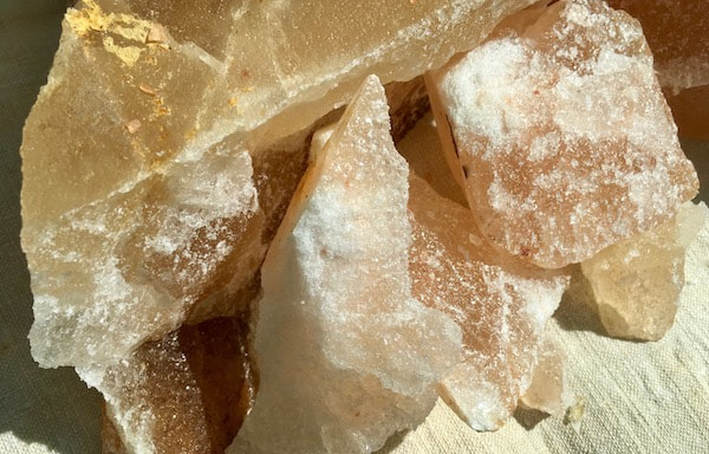 Salt rocks - yes it does. Above, I've been breaking up a huge slab of Himalyan rock salt. Back in the day, a million fetishes away, in an innocent world, pre-chia, pre-kale smoothies, pre-manuka honey, during the sizzling Australian, beach-filled summers, when KE Holdens had no air-conditioning, we were warned not to risk a day without taking a salt tablet. Back then, we were told that we lost dangerous amounts of salt through perspiration. Left unheeded, this would lead to muscle cramps, dehydration, brain-damage (and probably ultimately, a change in Monopoly tokens and feminism). We purposefully added salt to our diet, over and above our tinned spaghetti on toast and hot chips. What happened? Next we were told we ingested too much salt. We became salt-phobic. The warnings were intended to save us from among other things, high blood pressure. Now dietary studies suggest the salt fear is overblown and that it’s more a high carbohydrate problem (that wonderful crusty, sourdough bread). I remember when giving cooking classes years ago, I would add salt and the class, in unison, would gasp in horror. (They also gasped in horror when I buttered anything.) But no-one complained when the tasting started. In her just published book, Samin Nosrat (see review Salt Fat Acid Heat) writes about how to cook, rather than just recipes. She gave lessons to Michael Pollan and any friend of Mr Pollan is a friend of mine. As a young prep cook at Chez Panisse, she watched the chef adjust the salt in a polenta she was working on. (She also gasped, apparently!) “Cal grabbed spoons and together we tasted. Some indescribable transformation had occurred. The corn was somehow sweeter, the butter richer. All the flavours were more pronounced. I’d been certain Cal had turned my polenta into a salt lick, but no matter how I tried, the word salty did not apply to what I tasted. It was as if I’d been struck by lightening. It’d never occurred to me that salt was anything more than pepper’s sidekick.” Salt is natural and necessary – for health and for good cooking. It enhances. Purposefully withholding salt leads to bland. (Remember that salt can also come from adding olives, fish sauce, capers, anchovies, soy sauce etc.) All salt comes from the same place originally, whether it’s fleur de sel from the Ile de Ré (Poitou-Charentes), or Himalayan Pink or basic rock salt at the supermarket. My friends have not given up mountains of crispy bacon, or mountains of crispy chips or fries – they simply repeat the mantra “I know I shouldn’t but…” Get over it. You know you want to. So here’s my salt challenge. The optimum “good health” amount of salt a day is 5gm – that is 1 teaspoon of sodium chloride. The salt challenge is for those who eat their own food at every meal. (If you don’t eat your own food, you’re on your own.) Put a teaspoon of salt per household-person in a small bowl on the bench or windowsill to use during your cooking. I challenge you to get through that salt in a day. (For next time, I’ve been talking to marathon runners and “science” types, tasting black, red and pink salt, and seeking to debunk some fears and myths.)
3 Comments
ROSA MATTO
5/4/2018 04:07:46 pm
Oooh, I love Cal. Yes, it is so true. Salt deepens the taste, changes the texture of cooking. "Salty" food is unbalanced - not always a bad thing - sometimes the body craves salt, for its own reasons and needs. But, in the regular course of things - salting food while you're cooking is essential. I think it's too late to salt the food at the table - too much flavour and 'integrity' (!) has already been lost.
Reply
Barbara Santich
11/5/2018 09:22:55 pm
yes, I agree, salt is essential. And there is good salt and bad salt - or at least, less good salt. As you say, 'all salt comes from the same place, originally'. And here in Australia, our salt comes from the sea. So why do recipes specify 'sea salt' in the list of ingredients? Virtually any salt is sea salt, even the cheapest supermarket salt.
Reply
Leave a Reply. |
Categories
All
|
 RSS Feed
RSS Feed
